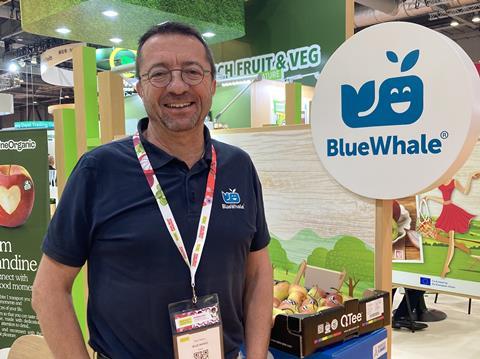Candine enjoys strong growth in Asia and French Pink Lady sales climb 30 per cent globally
As the apple season draws to a close, leading French cooperative Blue Whale has announced record turnover across all of its markets.

“This season has been defined by a good harvest both in terms of volume and quality,” stated Marc Peyres, commercial director at Blue Whale. “However, none of this would have been possible without the work we have carried out for years on innovation in order to adapt to changing conditions and market expectations.
“This is a long journey that encompasses all areas of the business, from farmers to marketing, sales and supply,” he noted. “This success comes from the ongoing effort of everyone, as well as their professionalism.”
Candine, Coeur de Reine and Pink Lady were the varieties that stood out for the French company this season, it said.
While Candine tripled sales driven by its popularity in Asia, Coeur de Reine doubled its sales figures in France.
With sales growth of 30 per cent globally, Pink Lady represented what Peyres considered to be “the most notable development of the season”.
Looking to the future, Blue Whale said that growth would continue to depend on innovation.
“90 per cent of the varieties we sell today didn’t exist 35 years ago,” Peyres explained. ”It is likely that most of those that we will sell in 30 years do not exist yet.
“We must continue to work hard to prepare for the future while supporting the success of varieties such as Pink Lady, which we developed 30 years ago,” he said. “Coeur de Reine, Candine and others that will emerge will be the ones that succeed in the future.”
Ensuring the supply of quality fruit year-round across the many markets it operates in, was another of the priorities for Blue Whale, it said.
To achieve this, the group of French producers is progressing on different lines of work, including increasing the production schedule with late-ripening varieties such as Joya, extending the season of the French Pink Lady, investing in cold storage and optimising the entire process from the harvest to handling in packaging plants.
The sustainable management of orchards is another of the cornerstones of the company to ensure stable volumes and quality.
“Over the last few seasons, the variability in quality due to extreme weather events has determined the dynamics of markets,” Peyres commented. “We must be ready for climate change and ensure the protection of crops, not only against hail but also against spring frosts, for example. The availability of water is becoming an essential factor.”
Indeed, in order to prepare for the future with more sustainable growing techniques, Blue Whale is leading the (Ré)Génération Fruit research project.
Implementing sustainable management also means ensuring economic feasibility for its farmers. This has led the company to restructure its organic range, adjusting its offer to actual demand, especially in France.
“We believe in a profitable organic market for our producers, but after some excessive developments, a restructuring was required,” Peyres continued. “In order for the organic market to grow again, organic apple production will be lower in France, but with better quality and better adapted varieties.”
Alongside its wide range of apples, Blue Whale said it was adding other fruits to its catalogue.
Premium pears, with varieties such as Angys, QTee and Fred; green and yellow kiwifruit with a new fruit plant devoted to the category opened this season; plums especially the Metis variety; and Apirena seedless table grapes, adapted to the tastes of current consumers; are now the focus of its diversification strategy, it noted.
This new fruit segment already provides a turnover of over €40m for Blue Whale, it said, and is expected to grow over the next five years.



